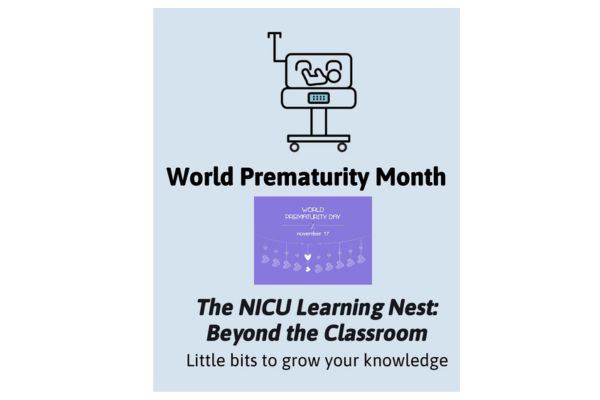
World Prematurity Month
Honoring Every Baby Born Too Soon: World Prematurity Month 2025
Each November, we come together to shine a light on one of the most significant challenges in global newborn health — premature birth. Around the world, 15 million babies are born too soon each year — that’s about one in ten live births. These are the babies who arrive before 37 weeks of gestation, often requiring weeks or months of specialized neonatal care before they’re ready to go home.
World Prematurity Month — and World Prematurity Day on November 17 — isn’t about celebrating NICU life in general. It’s about honoring the unique stories, challenges, and triumphs of those born prematurely, and the families and care teams who help them thrive.
🌍 A Global Challenge
Preterm birth is the leading cause of death among children under five. While advances in neonatal medicine have improved survival for even the smallest infants, where a baby is born still makes a profound difference. More than 60% of preterm births occur in Africa and South Asia, regions where access to antenatal steroids, respiratory support, and specialized neonatal care remains limited.
The World Health Organization (WHO) recently added World Prematurity Day to its official global health campaign calendar for the first time in 2025 — a recognition that this issue requires worldwide attention and collective action.
Organizations like March of Dimes, GAPPS (Global Alliance to Prevent Prematurity and Stillbirth), and the Global Foundation for the Care of Newborn Infants (GFCNI) are working to address both the medical and social roots of preterm birth — from maternal health and infection prevention to improving equity in neonatal care.
💜 The Role of Vermont Oxford Network
Here at home — and across the globe — the Vermont Oxford Network (VON) continues to make a measurable impact in advancing preterm infant outcomes. VON’s Global Health Initiative connects hospitals worldwide to share data, improve neonatal care practices, and reduce preventable mortality. By supporting quality improvement collaboratives, education, and partnerships in resource-limited settings, VON helps NICU teams everywhere learn from one another and close the gap between high-resource and low-resource outcomes.
For bedside nurses, this means the work you do — your documentation, your developmental care, your family education — feeds into a larger mission. It’s part of a worldwide effort to make sure every baby born too soon gets a fair start, no matter their birthplace.
👶 Advances and Ongoing Challenges
Decades of progress have changed what survival looks like for premature infants:
Antenatal corticosteroids and surfactant therapy have dramatically improved respiratory outcomes.
Kangaroo Mother Care and donor human milk have reduced complications like NEC.
Family-centered developmental care has transformed how we support bonding and long-term development.
Yet, for every baby who thrives, others face persistent barriers — lack of access, inequities in maternal health, or limited post-discharge follow-up. As global health organizations set goals to reduce preterm birth rates by 30% by 2030, the message is clear: survival is no longer the finish line — quality of survival is.
💬 What This Means for NICU Teams and Families
For NICU nurses, therapists, and providers, World Prematurity Month is both a reflection and a call to action. It’s a reminder that our daily work — comforting a parent during rounds, explaining a blood gas, adjusting humidity in an incubator — adds up to something far greater.
For families, it’s a reminder that they are not alone. Whether their baby was born at 24 weeks or 34 weeks, there is a community walking beside them — from hospital teams to parent organizations like Hand to Hold, March of Dimes, and GFCNI.
💭 Final Thoughts
Every tenth baby born worldwide begins life with both vulnerability and strength. Every nurse, therapist, physician, and parent who shows up for that baby becomes part of a global story of hope.
This November, wear purple, share a story, and take a moment to honor the babies born too soon — and the progress still to come. Together, through awareness, advocacy, and education, we can continue to make sure that every baby has the chance to not just survive, but thrive.
